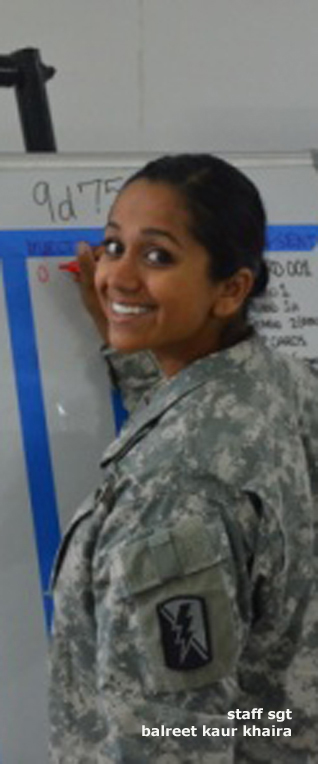People
Sikh-American Sisters Wow Their Army Countrerparts In India:
Staff Sgt Balreet Kaur Khaira & Sgt Jasleen Kaur Khaira
Capt JASON SWEENEY
Sacramento, California, USA
When it comes to bridging the cultural divide between soldiers from the U.S. and Indian armies, the California Army National Guard has a valuable go-between: the Sikh-American sisters, Jasleen Kaur Khaira and Balreet Kaur Khaira.
Staff Sgt. Balreet Kaur and Sgt. Jasleen Kaur were part of a 12-soldier California Guard contingent at exercise Yudh Abhyas 2014 -- joint military exercises -- which took place September 17-30 at Ranikhet Cantonment, India.
The Cal Guard team played the role of a United Nations Force Headquarters staff in a scenario which simulated a U.N. peacekeeping operation in Africa.
The Khaira sisters served on the staff for the exercise, but also acted as interpreters and cultural liaisons helping U.S. and Indian soldiers overcome language barriers and find common ground.
“Let’s ask the sisters,” was a commonly heard remark from American soldiers during the exercise. And Indian soldiers could often be seen crowded around the two sisters asking questions that were answered in fluent Punjabi and Hindi.
Their popularity even caught the attention of the Indian national media, which interviewed them for television and newspaper stories.
“The sisters were exceptional, model NCOs for the California National Guard,” said Col. Steven Buethe, the officer in charge of the Cal Guard contingent. “They exuded a positive image all the way around.”
Staff Sgt. Balreet Kaur was the operations NCO for the Cal Guard team.
Sgt. Jasleen Kaur was the personnel NCO and also served as a medic for the 189 U.S. soldiers who took part.
Both performed a variety of other tasks, everything from managing exercise requests for information to helping U.S. soldiers bargain for the lowest price for jewelry at the Ranikhet market.
The annual Yudh Abhyas exercise is sponsored by the U.S. Army Pacific Command. Each year, it alternates between India and the United States. The exercise has a goal of increasing interoperability between the armies of the two countries. A big part of the exercise each year involves cultural exchanges intended to increase understanding between soldiers from two very different nations with different cultural backgrounds and military traditions.
“The Sikh-American sisters have been a living symbol of the strong bonds between India and the United States and a bridge between the two armies,” said Lt. Col. Kenneth Koop, who was responsible for assembling the Cal Guard team. “They are proud of both their ancestral homeland, Punjab, and their adopted homeland, USA, and have worked tirelessly to help soldiers from both countries understand each other and grow towards mutual understanding and interoperability.”
The sisters have taken part in the three Yudh Abhyas exercises -- in Alaska in 2010; in Bathinda, Punjab, in 2012; and in the most recent exercise at Ranikhet in the shadow of the Himalayas in the state of Uttarakhand.
“The Indian soldiers obviously love it that we’re Sikh and in the U.S. Army,” Sgt. Jasleen Kaur said. “I think the biggest thing the Indian Army has learned from us is that we don’t just move to America and lose our Sikh and Punjabi roots. America is very diverse and you have all these populations that do keep their culture while still being part of the larger American culture. You can do both. You don’t have to get rid of one to participate in the other.”
Due to their father’s work in port cities, the sisters had an international upbringing spending the first part of their childhood in Africa, Hong Kong, Macao and their native Punjab, before immigrating to the U.S. when they were 12 and 14, just a week before 9/11. Their family finally settled in Temecula, California.
They did not come from a military family, and the expectation was for the sisters to complete higher education degrees and pursue medical careers. But both said something about the Army appealed to them.
“Growing up we’ve always been into doing something that’s just a little bit different than what everyone else does,” Balreet said.
She enlisted in the California Army National Guard at 17. She said she wanted the challenge and experience of being an Army medic, which she felt would be an advantage later on in a civilian medical career. During her military career, she deployed to Iraq, while also managing to complete a bachelor’s degree at the University of California, Riverside. Her long-term goal is to enter medical school and become a physician. Currently, she serves as a platoon sergeant for C Company, 40th Brigade Support Battalion, out of Montebello, California.
And if that isn’t enough, she also finds the time to own and operate a 7-Eleven convenience store in Mission Viejo, California.
Jasleen followed in her sister’s footsteps and enlisted in the Cal Guard as a medic while a student at U.C. Riverside. Currently, she serves as a squad leader with Headquarters and Headquarters Company, 578th Brigade Engineer Battalion, out of Manhattan Beach, California.
On the civilian side, she was recently hired as a registered nurse at Long Beach Memorial Medical Center and is studying to be a nurse practitioner.
Command Sgt. Major Paul Salinas hangs out with Indian Army soldiers at a social event following the opening ceremony for Yudh Abhyas 2014 at Chaubattia Cantonment, India, on September 17.
Command Sgt. Major Paul Salinas hangs out with Indian Army soldiers at a social event following the opening ceremony for Yudh Abhyas 2014 at Chaubattia Cantonment, India, on September 17.
“They are force multipliers,” Command Sgt. Maj. Paul Salinas, the senior NCO for the Cal Guard contingent at Yudh Abhyas 2014, said of the sisters. “Both are well educated and come with great interpersonal skills and the experience of working multiple Yudh Abhyas exercises.”
Both sisters said the California Army National Guard has given them opportunity, leadership skills and a variety of invaluable experiences, including the chance to visit India as American soldiers working alongside the Indian Army.
“I didn’t think I would like it as much as I do,” Staff Sgt. Balreet said of her time in the Cal Guard. “The military has benefitted me in a lot of ways, mostly in terms of self development. I don’t think I’d be the person I am today had it not been for the military — the experiences that I’ve had in the Guard.”
[Courtesy: DVIDS. Edited for sikhchic.com]
December 27, 2014
Conversation about this article
1: Jasvir Kaur (Calgary, Alberta, Canada), December 27, 2014, 6:09 PM.
Immensely proud of you, ladies.
2: Fatehpal Singh Tarney (Boca Raton, Florida, USA), December 28, 2014, 8:16 PM.
I am so proud of these young Kaurs in the U.S. Army. However, this is a bitter-sweet story in that I suspect that all qualified Sikh women are welcomed with open arms into the American armed forces, whereas jawan Saabat Soorat Sardars are not. There was a time, however, during the American Civil War, when soldiers on both sides, fought with long hair and beards and this was commonplace with no loss of discipline or battlefield efficiency. My historical research suggests that it was the influence of the Prussian military that resulted in the push for no beards and very short hair. Prussia was the source and impetus for a series of aggressive wars in Europe including the two world wars. Surely, the American military could have chosen a better role model.




